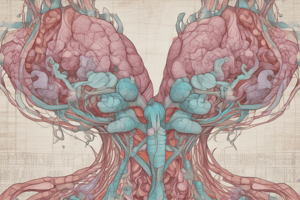Podcast
Questions and Answers
What happens to the CNS in young animals during hyperthyroidism?
What happens to the CNS in young animals during hyperthyroidism?
- Increased growth and excitability (correct)
- Slowed cerebration
- Stunted cognitive development
- Permanent damage to brain structure
Which symptom is commonly observed in cats with hyperthyroidism?
Which symptom is commonly observed in cats with hyperthyroidism?
- Alopecia
- Hypertension (correct)
- Weight gain
- Bradycardia
What is the pathophysiological consequence of hypothyroidism on metabolism?
What is the pathophysiological consequence of hypothyroidism on metabolism?
- Accelerated metabolism
- Increased protein synthesis
- Decreased energy expenditure (correct)
- Halted metabolism
What is the most likely cause of hyperthyroidism in cats?
What is the most likely cause of hyperthyroidism in cats?
What effect does excess T4/T3 have on muscle function?
What effect does excess T4/T3 have on muscle function?
Which cardiovascular change is commonly observed in cats with hyperthyroidism?
Which cardiovascular change is commonly observed in cats with hyperthyroidism?
Which of the following is a consequence of hypertension in cats with hyperthyroidism?
Which of the following is a consequence of hypertension in cats with hyperthyroidism?
Which condition is characterized by stunted growth and heavy body weight in young animals?
Which condition is characterized by stunted growth and heavy body weight in young animals?
What cardiovascular effect is most prominently associated with hyperthyroidism?
What cardiovascular effect is most prominently associated with hyperthyroidism?
Which result from increased thyroid hormone levels can lead to symptoms of anxiety in affected individuals?
Which result from increased thyroid hormone levels can lead to symptoms of anxiety in affected individuals?
What symptom would most likely indicate hypothyroidism in an adult animal?
What symptom would most likely indicate hypothyroidism in an adult animal?
Which clinical sign is particularly indicative of advanced hyperthyroidism in cats?
Which clinical sign is particularly indicative of advanced hyperthyroidism in cats?
How does hyperthyroidism affect the metabolic processes in cats?
How does hyperthyroidism affect the metabolic processes in cats?
Which of the following is a common cardiovascular change associated with feline hyperthyroidism?
Which of the following is a common cardiovascular change associated with feline hyperthyroidism?
What potential electrolyte abnormality might be seen in cats suffering from hyperthyroidism?
What potential electrolyte abnormality might be seen in cats suffering from hyperthyroidism?
Which factor is believed to trigger the development of benign thyroid tumors leading to hyperthyroidism in cats?
Which factor is believed to trigger the development of benign thyroid tumors leading to hyperthyroidism in cats?
Which behavioral change is commonly observed in cats with hyperthyroidism?
Which behavioral change is commonly observed in cats with hyperthyroidism?
What is a notable change in skin condition seen in hyperthyroid cats?
What is a notable change in skin condition seen in hyperthyroid cats?
Which physiological mechanism is NOT influenced by excess T4/T3 in hyperthyroid cats?
Which physiological mechanism is NOT influenced by excess T4/T3 in hyperthyroid cats?
In hyperthyroidism, what causes the increased metabolic rate across all organs?
In hyperthyroidism, what causes the increased metabolic rate across all organs?
What is one of the primary contributing symptoms of tachycardia in hyperthyroid cats?
What is one of the primary contributing symptoms of tachycardia in hyperthyroid cats?
Which statement accurately describes a consequence of hyperthyroidism in adult animals?
Which statement accurately describes a consequence of hyperthyroidism in adult animals?
What physiological change is linked to hypothyroidism in young animals?
What physiological change is linked to hypothyroidism in young animals?
How does hyperthyroidism affect the skin of affected animals?
How does hyperthyroidism affect the skin of affected animals?
Which symptoms are associated with hyperthyroid cats?
Which symptoms are associated with hyperthyroid cats?
What circulatory effect is typically seen in hyperthyroid animals?
What circulatory effect is typically seen in hyperthyroid animals?
How would a deficiency in thyroid hormones affect adult animals?
How would a deficiency in thyroid hormones affect adult animals?
Which of the following best describes the clinical signs of thyroid hormone excess?
Which of the following best describes the clinical signs of thyroid hormone excess?
What effect do T3 and T4 hormones have on body temperature regulation?
What effect do T3 and T4 hormones have on body temperature regulation?
Which of the following clinical signs would least likely indicate hyperthyroidism in cats?
Which of the following clinical signs would least likely indicate hyperthyroidism in cats?
What underlying factor is believed to stimulate the development of adenomas in the thyroid glands of cats?
What underlying factor is believed to stimulate the development of adenomas in the thyroid glands of cats?
Which change in body function is associated with the impact of increased T4/T3 levels on muscle characteristics?
Which change in body function is associated with the impact of increased T4/T3 levels on muscle characteristics?
Tachycardia in hyperthyroid cats is primarily due to which of the following factors?
Tachycardia in hyperthyroid cats is primarily due to which of the following factors?
Which clinical sign is least associated with hyperthyroidism in cats despite being a common symptom in other conditions?
Which clinical sign is least associated with hyperthyroidism in cats despite being a common symptom in other conditions?
In hyperthyroidism, changes to skin condition are often a result of what underlying issue?
In hyperthyroidism, changes to skin condition are often a result of what underlying issue?
What effect does hyperthyroidism have on renal function in cats?
What effect does hyperthyroidism have on renal function in cats?
Which physiological effect of excess thyroid hormones potentially contributes to symptoms of anxiety in hyperthyroid cats?
Which physiological effect of excess thyroid hormones potentially contributes to symptoms of anxiety in hyperthyroid cats?
Which statement about the metabolic effects of hyperthyroidism is accurate?
Which statement about the metabolic effects of hyperthyroidism is accurate?
What is the likely clinical consequence of prolonged hypertension in cats with hyperthyroidism?
What is the likely clinical consequence of prolonged hypertension in cats with hyperthyroidism?
Flashcards are hidden until you start studying
Study Notes
Thyroid Hormone - Selected Effects on Body Tissues
- Thyroid hormone impacts multiple bodily systems in both excess and deficient conditions.
- Excess thyroid hormone (Hyperthyroidism) leads to accelerated growth and weight loss.
- Deficient thyroid hormone (Hypothyroidism) leads to retarded growth and weight gain.
- Hyperthyroidism stimulates all body functions, leading to nervousness, excitability, anxiety, insomnia, tachycardia, hypertension, and tachypnea.
- Hypothyroidism slows down all body functions, leading to lethargy, somnolence, and follicle atrophy.
- Hyperthyroidism effects on skin: follicle atrophy leads to bilateral alopecia, myxedema, and pigmentation.
- Hypothyroidism effects on skin: follicle atrophy leads to bilateral alopecia, myxedema, and pigmentation.
Hyperthyroidism / Thyrotoxicosis (in Cats)
- Hyperthyroidism is excessive secretion of thyroid hormones.
- Commonly occurs in middle-aged to old cats.
- Rare in other species.
- Mostly caused by benign thyroid tumors secreting T4/T3 (adenomas).
- Cause of adenomas is unknown, but chemicals are believed to stimulate cell division in the thyroid gland.
Hyperthyroidism: Old Cats
- Hyperthyroidism is a common endocrine disorder in older cats.
- Clinical presentation is slow and progressive.
Hyperthyroidism / Thyrotoxicosis (in Cats)
- Clinical Signs:
- Weight loss, muscle weakness, and wasting, mild fatty liver syndrome.
- Normal or increased appetite (polyphagia).
- Hyperactivity, nervousness, and anxiety.
- Heat intolerance and increased skin temperature.
- Tachycardia and hypertension.
- Polyuria and polydipsia (due to medullary washout and hypertension).
- Vomiting and diarrhea.
- Skin changes (matted hair or alopecia due to behavioral changes; rapid claw growth).
Hyperthyroidism
- Excess T4/T3 increases metabolic rate, leading to increased glycolysis, lipolysis, ATP production, and heat production.
- Increased metabolism leads to protein catabolism, resulting in muscle weakness and weight loss.
- Excess hormones promote quicker muscle relaxation and favors contraction, leading to hyperactivity.
- Increased beta-1 adrenoreceptors increase sympathetic nervous system activity, leading to hyperactivity, increased core body temperature, and changes in behavior.
- Increased protein synthesis of Myosin and Actin contributes to cardiac hypertrophy.
- Increased metabolism leads to vomiting, alopecia, diarrhea, and vocalizations.
- Increase in Ca pumps and Ca-gated channels leads to tachycardia and increased contractility.
- Blood pressure increases, leading to retinopathy, renal dysfunction, electrolyte abnormalities, and polyuria/polydipsia.
Hypothyroidism (in Dogs)
- Insufficient production or secretion of thyroid hormone.
Thyroid Hormone
- Thyroid hormone (TH) has multiple effects on body tissues.
- In young animals, excess TH accelerates growth but can result in early closure of epiphyses, leading to stunted and heavy bodies.
- In adult animals, excess TH causes weight loss and increased metabolism.
- In young animals, deficiency of TH retards CNS and body growth, resulting in cretinism.
- In adult animals, deficiency of TH causes lethargy and weight gain.
Hyperthyroidism
- Hyperthyroidism is excessive secretion of thyroid hormones, commonly seen in middle-aged to older cats.
- Benign thyroid tumors secreting T4/T3 (adenomas) are the primary cause.
- Clinical signs include weight loss, muscle weakness, polyphagia, hyperactivity, heat intolerance, tachycardia, hypertension, polyuria/polydipsia, vomiting, diarrhea, and skin changes.
- Excess T4/T3 increases metabolic rate, leading to increased glycolysis and lipolysis, ATP production, protein catabolism, and heat production.
- Increased calcium pumps accelerate muscle relaxation, while increased calcium-gated channels enhance contraction, further contributing to muscle weakness and hyperactivity.
- Increased beta-1 adrenoreceptors amplify sympathetic division activity, resulting in hyperactivity and elevated core body temperature.
- Further effects include tachycardia, cardiac hypertrophy, hypertension, retinopathy, renal dysfunction, electrolyte abnormalities, and PU/PD.
Hypothyroidism
- Hypothyroidism is insufficient production or secretion of thyroid hormones, commonly seen in dogs.
Thyroid Gland
- Thyroxine (T4) and Triiodothyronine (T3) are produced by the thyroid gland
Hyperthyroidism
- Common in middle-aged and old cats
- Caused by benign thyroid tumors called adenomas
- Clinical Signs: Weight loss (despite increased appetite), muscle weakness, hyperactivity, heat intolerance, tachycardia, hypertension, polyuria, polydipsia, vomiting, diarrhea, alopecia, and rapid claw growth
- Underlying Mechanisms:
- Increased metabolic rate, leading to weight loss (due to increased glycolysis and lipolysis)
- Increased protein catabolism, leading to muscle weakness
- Increased calcium pump activity, leading to quicker muscle relaxation
- Increased calcium-gated channel activity, leading to favored contraction in certain muscles
- Increased beta-1 adrenoreceptor activity, leading to an increase in sympathetic nervous system activity and hyperactivity.
- Increased Type V1 Myosin, influencing contractility
- Influences protein synthesis, leading to an increase in myosin and actin
Hypothyroidism
- Common in dogs
- Caused by insufficient production of thyroid hormones
- Clinical Signs: Weight gain, lethargy, slow heart rate, decreased appetite, hair loss, cold intolerance, slow reflexes, and decreased mental activity.
Studying That Suits You
Use AI to generate personalized quizzes and flashcards to suit your learning preferences.




